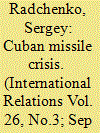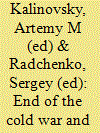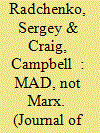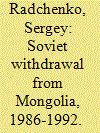|
|
|
Sort Order |
|
|
|
Items / Page
|
|
|
|
|
|
|
| Srl | Item |
| 1 |
ID:
117430


|
|
|
|
|
| Publication |
2012.
|
| Summary/Abstract |
This article reviews major issues in the historiography of the Russian/Soviet side of the Cuban missile crisis, as it has developed since the early 1990s. Focusing on key works, including Fursenko and Naftali's One Hell of a Gamble and Mikoyan's Anatomi'ia Karibskogo Krizisa, the article explores three issues: why Nikita Khrushchev decided to send missiles to Cuba, why he resolved to withdraw them, and how close the world came to 'the brink'. The author contends that in our understanding of the Kremlin's motivations in the Cuban missile crisis, we have come to over-rely on disparate pieces of 'evidence', which, at closer investigation, turn out to be one-sided, undocumented, or demonstrably false. The author therefore urges caution in drawing far-reaching conclusions from the crisis, especially in projecting its uncertain lessons onto the broader scholarship on the Soviet decision making during the Cold War.
|
|
|
|
|
|
|
|
|
|
|
|
|
|
|
|
| 2 |
ID:
108746


|
|
|
|
|
| Publication |
London, Routledge, 2011.
|
| Description |
xii, 315p.Hbk
|
| Series |
Cold War History Series
|
| Standard Number |
9780415600545
|
|
|
|
|
|
|
|
|
|
|
|
Copies: C:1/I:0,R:0,Q:0
Circulation
| Accession# | Call# | Current Location | Status | Policy | Location |
| 056356 | 909.097240829/KAL 056356 | Main | On Shelf | General | |
|
|
|
|
| 3 |
ID:
175623


|
|
|
|
|
| Summary/Abstract |
This special issue examines NATO’s past with an eye to better understanding its present and its future. NATO’s history, now running over seventy years, can no longer be framed in Cold War terms alone. Nor can the organization be understood fully as a post-Cold War institution. Today’s NATO is a product of both of these eras. A reconsideration of NATO’s place in history encourages us to consider NATO’s past, even its contemporary past, from different angles. The articles in this special issue move away from studying NATO’s relationship with any one particular geopolitical event or crisis and instead examine how NATO developed over years and over decades. This effort to draw back the historical lens has had revealing results. It opens new vistas for explaining how NATO thrived and survived for decades, and pondering whether it will survive for many more.
|
|
|
|
|
|
|
|
|
|
|
|
|
|
|
|
| 4 |
ID:
158009


|
|
|
|
|
| Summary/Abstract |
The revival of nuclear strategy in US policy and scholarship has been strengthened by arguments that the ‘nuclear revolution’ – the assumption that thermonuclear bombs and missiles had made major war too dangerous to wage – does not affect international behaviour as much as nuclear revolution advocates claim. This article shows that the Soviet leader Nikita Khrushchev indeed regarded nuclear war as too dangerous to wage, a decision which manifested itself not so much in foreign policy or military doctrine but in his determination to avoid war when the possibility arose. We argue that Khrushchev’s experience provides us with a more useful way to characterise the nuclear revolution and suggest some implications of this argument for contemporary debates about nuclear weaponry.
|
|
|
|
|
|
|
|
|
|
|
|
|
|
|
|
| 5 |
ID:
156665


|
|
|
|
|
| Summary/Abstract |
This paper examines the full cycle of political power transitions and the dynamics of party competition during the 2016 parliamentary and 2017 presidential elections in Mongolia. It argues that the existence of multiple interlinked patronage networks and factionalism explains the persistence of the electoral democracy in Mongolia. The article focuses on the internal politics of the Democratic Party.
|
|
|
|
|
|
|
|
|
|
|
|
|
|
|
|
| 6 |
ID:
175624


|
|
|
|
|
| Summary/Abstract |
This article recounts Russia’s response to NATO’s eastern enlargement. It argues that NATO enlargement was seen as perfectly acceptable in Moscow, as long as it was inclusive of Russia, which would gain in status as America’s key partner and ally. Once it became apparent that Russia would not be invited to join, the narrative changed to active opposition, as Boris Yeltsin sought domestic legitimacy from being perceived as thedefender of the national interest against Western encroachment. The article highlights the fluid nature of so called national interests, which are defined and redefined in ways affording the greatest legitimation to the political elites.
|
|
|
|
|
|
|
|
|
|
|
|
|
|
|
|
| 7 |
ID:
121004


|
|
|
|
|
| Publication |
2013.
|
| Summary/Abstract |
This article details Soviet military withdrawal from Mongolia between July 1986, when the first announcement was made of a partial withdrawal and December 1992, when the last detachment of Soviet servicemen crossed the Russian-Mongolian border. The author shows that the decision to withdraw forces from Mongolia was made in Moscow, part and parcel of Mikhail Gorbachev's policy aimed at achieving rapprochement with the People's Republic of China. The Mongols only grudgingly went along, fearful of being left defenseless before China. It was not until 1989 that the Mongolian leadership evidenced serious interest in the departure of Soviet troops; when they did, it was partly a response to the build-up of nationalist sentiment prompted by greater openness and democratization, as well as a function of Mongolia's efforts to find for itself a new role on the international stage. The author argues that the Soviet departure was hasty, ideologically charged, and poorly thought out. Maintaining a token force in Mongolia would have allowed Russia to retain a degree of influence in the country over the long term without serious negative consequences for Russian-Mongolian relations.
|
|
|
|
|
|
|
|
|
|
|
|
|
|
|
|
|
|
|
|
|